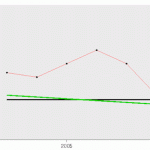Climate
Oliver Morton wrote a delightful book all about photosynthesis called Eating the Sun: How Plants Power the Planet, which I reviewed earlier this year for Search Magazine (R.I.P.) under the title "A Song for the Heartless". One of my favorite passages in the book beautifully explains the difference between art and science:
Discoveries feel determined. They are there to be made, and if one person doesn't, another will. This doesn't lessen the achievement; indeed it can give it spice. The thought that 'this is the way the world is--and I am the first to see it as such' is an intoxicating…
By now, I'd expect the authors of Superfreakonomics are having mixed feelings about their new book. On the one hand, they're making good money as the book enjoys healthy sales. On the other, just about every actual expert in the field to which Chapter 5 is devoted -- climate change -- has savaged their take on the subject.
This week comes perhaps the most devastating criticism, from four statisticians whose analysis of global temperature trends demonstrates just how wrong Steven D. Levitt and Stephen J. Dubner got the numbers. And an AP story on the statisticians' analysis raises some serious…
For those who really grok the precautionary principle, aiming for a lower, and therefore inherently safer, maximum atmospheric carbon-dioxide concentration is the logical choice. Civilization arose over the last 10,000 years in a world in which CO2 represented just 280 of every million atoms we and every other respiring organism inhaled. Given the uncertainty over what level of the trace gas leads to dramatic changes in the climate -- we know there's a relationship but haven't been able to nail down the tipping point -- the closer to pre-industrial levels the better.
But there's a problem.…
Another depressing poll result from one of the more reputable sources:
The latest national survey by the Pew Research Center for the People & the Press, conducted Sept. 30-Oct. 4 among 1,500 adults reached on cell phones [excellent!] and landlines, finds that 57% think there is solid evidence that the average temperature on earth has been getting warmer over the past few decades. In April 2008, 71% said there was solid evidence of rising global temperatures.
Why the drop?
According to the experts that appear in the Guardian's story, it's the economy and corporate propaganda:
Michael…
Not being a regular, or even occasional, listener of Rush Limbaugh, I have no idea if this week's obscene call for New York Times climate reporter Andy Revkin to commit suicide was simply par for the course. We all know that Limbaugh is an entertainer who is just doing what he needs to do to attract attention, maintain audiences and retain advertiser support. It's a free country (for most of us). But I'm a journalist and I cover climate change, too. So this hits too close to home to ignore.
On Tuesday, Limbaugh's radio show included this line: "Mr. Revkin, why don't you just go kill yourself…
In which your humble blogger makes a desperate attempt to write something original about the latest affront to reasonable discourse in the global warming crisis.
There's little point in duplicating the devastating criticism that has been leveled at Superfreakonomics, the sequel to the wildly popular book, Freakonomics, by Steven D. Levitt and Stephen J. Dubner. I will point to just two examples: Gavin Schmidt's take-down at Real Climate, and Joe Romm's series at Climate Progress. But there are plenty more.
Even NPR couldn't run an interview with one of the authors without including a…
Every now and then a commenter at this or any number of other climate-oriented blogs spews out the phrase "the height of arrogance" and uses it in a way that defies logic. For example, one "Bruce" recently wrote
"It is the height of arrgoance [sic] to suggest a trace gas like CO2 has anything to do with the climate cycles."
No, Bruce, it's not arrogant to accurately portray the chemistry and thermodynamics of climatology. This morning, however, I did find a case to which the phrase might be applied with some degree of accuracy:
Alberta's oil sands producers should be allowed to significantly…
Some group of bloggers has decided that today, Oct. 15, 2009, is "Blog Action Day." And this year's theme is climate change. Excellent, Smithers.
My instincts are to ignore such declarations. It's always an International Year of This or National X Awareness Month, or World Y Day. Community newspapers take advantage of free copy and extra revenue by organizing special advertising supplements around them. I've always thought that they interfere with genuine news values by wasting space and resources on what are more or less abritrary pet-project campaigns.
But I've been planning on writing a…
Hmmm. Not sure this will accomplish what the British government hopes it will.
On the other hand, the U.K. is far ahead of most of the rest of the world when it comes to getting serious about greenhouse-gas emission legislation -- no one else has binding targets, and 34 per cent below 1990 levels by 2020 is among the most ambitious around. So maybe they do know what they're doing. Probably not, but still...
Most observers of climate change media coverage long ago stopped wringing their hands every time Fox News reported that global warming has stopped and that humans are responsible anyway, mostly to avoid calluses. A while back it seemed like Fox might be ready to embrace the actual science, but old habits die hard. For example, Fox took a Sky News story back in August that suggested we may be on the verge of returning to record warm years and gave it the headline of "Natural Factors Could Cause Global Warming."
Yes, the story was about solar activity, but here's the nub of the science that was…
It's ! It's also the week before the Geological Society of America annual meeting, and I'm going to be spending this week running around like a chicken with my head cut off, trying to get everything graded, an exam written, a post written about my talk (Tuesday afternoon), and my student's poster printed. (He's graduated and currently fighting forest fires, and he put the draft poster together by himself, so I guess I can wrestle with the dreaded plotter.) So I'm probably not going to try to help you understand climate myself. However, I can be a cheerleader for this week's events!
Tuesday…
Sugar-book author H. Leighton Steward, about whom I have written before, was on Capitol Hill this week arguing that rising CO2 concentrations are nothing to worry about. Among his claims is this, as reported by US News & World Report's Paul Bedard:
As an example, he said that Earth's atmosphere currently has about 338 [sic] parts per million of CO2 and that in Navy subs, the danger level for carbon dioxide isn't reached until the air has 8,000 parts per million of CO2.
If there was a prize for most irrelevant factoid ever offered in the history of climate change policy debates, other…
Let's just make one thing clear: I believe anthropogenic climate change constitutes the most serious public policy challenge of our time, second only in the history of civilization to global thermonuclear warfare. It's hard to overstate the danger of business as usual when it comes to our fossil-fuel emissions. If, as a growing number of climatologists believe, we are headed for a world that is 4 °C warmer than pre-industrial norms by the latter half of this century, then averting that scenario should be at the top of everyone's priority list.
Still, it is still possible to exaggerate the…
Well, I play Air hockey, Ball hockey, Barn Hockey, Bubble Hockey, Field hockey, Floor hockey, Ice hockey, Kitchen hockey, Road hockey, Roller hockey, Table hockey, Twist hockey
And I play hockey, hockey, hockey, hockey, hockey, hockey, hockey, hockey, hockey, hockey, hockey, hockey, hockey, hockey, hockey all the time!
Take shots!
-- Jughead
Take shots, indeed. Steve McIntyre is at it again, Tim "Deltoid" Lambert has the goods, and Gavin at Real Climate has an even more snarky response. But if you're too lazy to read the whole torrid thing, I'll summarize, because I'm pretty good at it, if I…
With all due respect to the recipients of this year's Nobel prizes -- telomeres are more than worthy of our attention -- it's time for an overhaul of the whole thing.
Complaints about the outdated categories that ignore an enormous range of scientific endeavors appear each year at this time, and it's unlikely that the latest barrage of criticism will result in any real change. Still, there are plenty of good argument in favor of reform. Here's one.
New Scientist asked a group of notable scientists and authors for their thoughts on the subject. They came up with a letter pointing out the…
It's not a home run by any stretch of the imagination, but the Senate's counterpart to the Waxman-Markey climate change bill (a.k.a. ACES) that the House narrowly passed earlier this year at least gets global warming onto first base. There's bad and good in the awkwardly titled Clean Energy Jobs and American Power Act, of course, and it still won't get us anywhere the kind of greehouse gas emissions levels than even the conservative climatologists say are necessary. The differences between the bills are worth exploring.
The sections that most pique my curiosity are devoted to emissions…
U.S. Energy Secretary Stephen Chu is all about saving the coal industry. In the latest issue of Science, which includes a feature series on carbon capture and sequestration, he writes optimistically about the challenges and opportunities such technologies pose and why it could save us all from catastrophic climate change.
At least, that's what I take away from his short essay. I don't doubt Chu's sincerity, or his ability to synthesize data. He is, after all, a holder of Nobel Prize for physics. But I'm afraid he hasn't got a good grip on the economics of the matter.
In his essay, Chu writes…
The journal Nature has just published a massive feature series on, to use a well-worn phrase, "the limits to growth." The centerpiece is a graphic created by Johan Rockström of the Stockholm Resilience Centre and his colleagues as part of "a new approach to defining biophysical preconditions for human development. For the first time, we are trying to quantify the safe limits outside of which the Earth system cannot continue to function in a stable, Holocene-like state." Here's their wheel of misfortune:
The green is the safe limit, the red represents more or less where we are. For those…
In NewScientist today, there is a little article that describes the different types of carbon offsets you can purchase. It's not too informative and I much prefer articles with a little more of a critical eye, such as this 2007 piece in BusinessWeek or this piece from the NYTimes blog on confusing carbon labels. (By the way, be sure to check out the UK offset parody Cheat Neutral).
Truth is, I have been bored by carbon offsets for ages (ever since I did my master's related to carbon trading--back in 2002, when they were still calling it 'carbon sequestration' and the concept had not yet…


